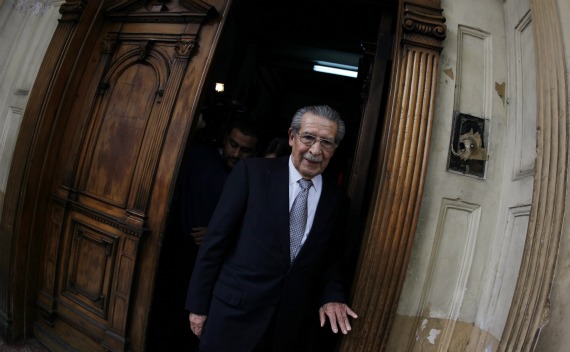Note: This post originally appeared on The Council on Foreign Relations Latin America’s Moment blog. Read the original here.
Last Thursday, former de facto President of Guatemala during military rule, General (ret) Efraín Ríos Montt walked into the Attorney General’s office to ask whether they planned on trying him on ten-year-old war crime charges anytime soon. He stands accused of committing genocide and crimes against humanity against indigenous civilians in the early 1980s – the most violent years of the country’s civil war. Flanked by his lawyer and a gaggle of reporters, he calmly told public prosecutors, “I’m here, I’m healthy, and I’m not afraid… if there’s a criminal investigation against me, it should go forth according to due process and I should stand trial.” While this may seem like an ill-advised move, it’s actually quite cunning given the weak hand he now holds.
When the new legislature takes office next month, Ríos Montt will officially lose his congressional seat, and with it his immunity from prosecution (granted to all members of congress unless they’re removed by court order). What’s more, the party he led for over two decades – the Guatemalan Republican Front (FRG) – is weaker than ever – winning just 2 percent of the vote in local elections last September. This is not good news for Ríos Montt, who has had his differences in the past with incoming president Otto Perez Molina. Longstanding tension between the two came to a head in 2000 when Perez Molina left army ranks to form his own Patriot Party (PP) after the ruling FRG government denied him a top spot in the military.
The newly strengthened Attorney General’s office may be an even bigger problem for the aging ex-General. With Claudia Paz y Paz at the helm this year, the Public Ministry has shown that it is willing and able to aggressively pursue his case, convicting four soldiers and charging five more for their roles in two massacres that occurred on Ríos Montt’s watch. But if he leaves the country he risks facing an even fiercer opponent in Spain’s National Court, which issued an international arrest warrant for Ríos Montt on genocide charges in 2006.
An obvious reason why Ríos Montt turned himself in voluntarily is that he wants to avoid the embarrassment of a very public arrest. He also may be angling to get in the good graces of public prosecutors, who have already detained his third in command, former Chief of Staff Hector Mario López Fuentes for acts of genocide. He has made clear that he intends to shed all responsibility onto his subordinates, using the excuse that he was the political, not the military leader during the civil war and was not aware of any human rights abuses. Regardless of his motives, the fact that Ríos Montt has to engage with the charges at all shows that something may finally be right with Guatemala’s fledgling justice sector.

Reply